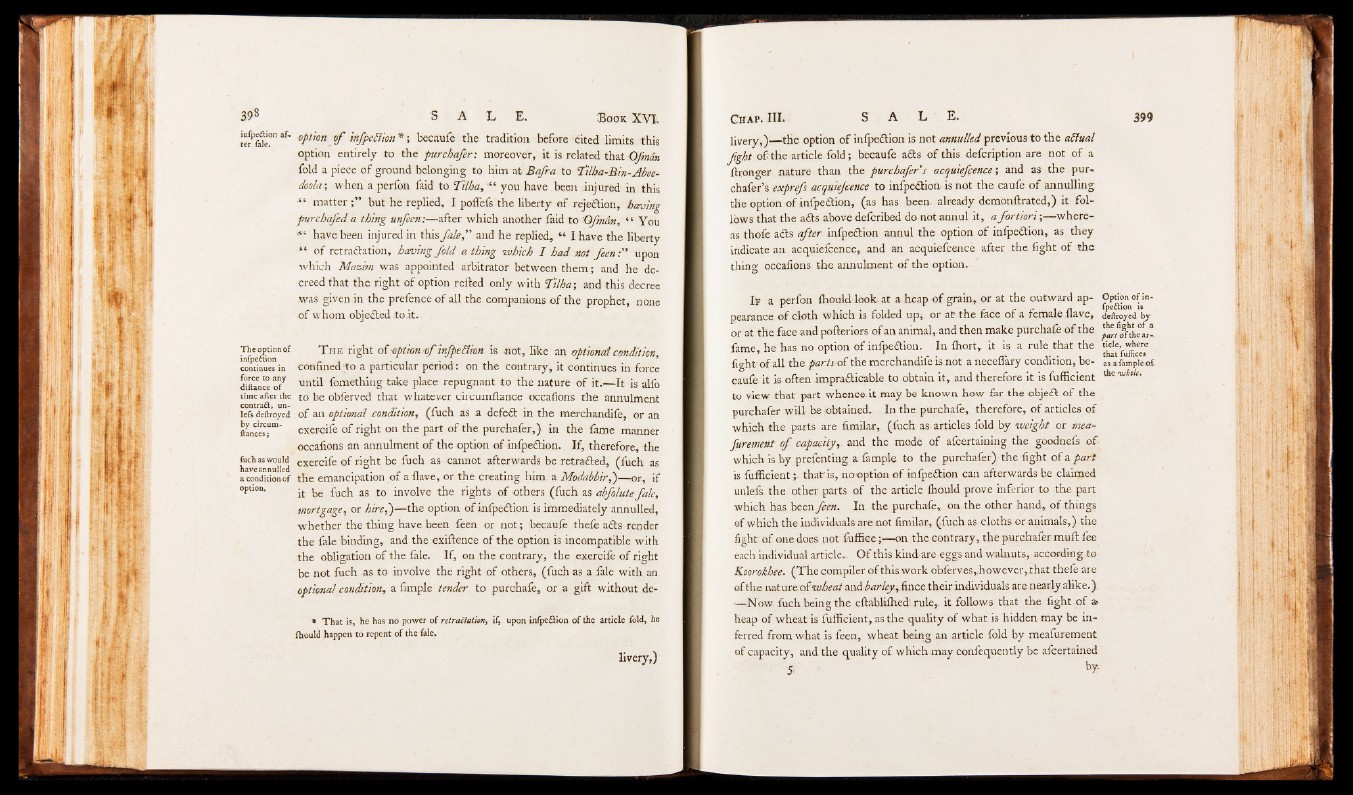
infpe&ion after
fale.
The option of
infpe&ion
continues in
force to any
diltance of
time after the
contract, un-
lefs deftroyed
by circum-
ftances;
fuch as would
have annulled
a condition of
option.
option o f infpeBion * ; becaufe the tradition before cited limits this
option entirely to the purchafer: moreover, it is related that Ofm&n
fold a piece of ground belonging to him at Bafra to Tilha-Bin-Abec-
doola; when a perfon faid to T il ha, •“ you have been injured in this
matter;” but he replied, I poflefs the liberty of rejection, having
pur chafed a thing unfeen:— after which another faid to 'Qfman., “ You
have been injured in this fa le ," and he replied, “ I have the liberty PJ ° f retractation, having fold a thing which I had not feen -" upon
which Mazim was appointed arbitrator between them; and he decreed
that the right of option refted only with Tilha; and this decree
.was given in the prefence of all the companions of the prophet, none
of whom objected to it.
T h e right of option o f infpeHion i6 not, like an optional condition,
confined to a particular period: on the contrary, it continues in force
until fomething take place repugnant to the nature of it.— It is alfo
to be obferved that whatever circumftance occafions the annulment
of an optioned .condition, (fuch as a defeCt in the merchandife, or an
exercife of right on the part of the purchafer,) in the fame manner
occafions an annulment of the option of infpeCtion. If, therefore, the
exercife of right be fueh as cannot afterwards be retracted, (fuch as
the emancipation of a Have, or the creating him a Modabhir,)— or, if
it be fuch as to involve the rights of others (fuch as abfolute fale,
mortgage, or hire,')— the option of infpeCtion is immediately annulled,
whether the thing have been feen or not; becaufe thefe aCts render
the fale binding, and the exiftence of the option is incompatible with
the obligation of the fale. If, on the contrary, the exercife of right
be not fuch as to involve the right of others, (fuch as a fale with an
optional condition, a Ample tender to purchafe, or a gift without de-
* T h a t is, he has no power of retractation, if, upon infpeCtion of the article fold, he
lhould happen to repent of the fale.
l i v e r y ,)
livery,)— the option of infpeCtion is not annulled previous to the aflual
fg h t oft the article fold; becaufe aCts of this defeription are not of a
flronger nature than the purchafer's acquiefcence; and as the pur-
chafer’s exprefs acquiefcence to infpeCtion is not the caufe of annulling
the option of infpeCtion, (as has been already demonltrated,) it follows
that the aCts above deferibed do not annul it, a fortiori;— whereas
thofe aCts after infpeCtion annul the option of infpeCtion, as they
indicate an acquiefcence, and an acquiefcence after the fight of the
thing occafions the annulment of the option.
I t a perfon lhould look at a heap of grain, or at the outward ap- Opumonn-
pearance of cloth which is folded up, or at the face of a female Have, deftroyed by
or at the face and polteriors of an animal,.and then make purchafe of the
fame, he has no option of infpeCtion. In fhort,. it is a rule that the tide, where
r . . . . . . . that fufnee*
fight of all the parts of the merchandife is not a neceiiary condition, DC- as a fample o£
caufe it is often impracticable to obtain it, and therefore it is fufficient the ’wUU'
to view that part whence it may be known how far the objeCt of the
purchafer will be obtained. In the purchafe, therefore, of articles of
which the parts are fimilar, (fuch as articles-fold by weight or mea-
furement- o f capacity,, and the mode of afeertaining the goodnefe of
which is by prefenting a fample to the purchafer) the fight of a part
is fufficient;. thatris, nooption of infpeCtion can afterwards be claimed
unlefs the other parts of the article (hould prove inferior to the part
which has been feen. In the purchafe, on the other hand, of things
of which the individuals are not fimilar, (fuch as cloths or animals,) the
fight1 of one does not fuffiee;— on the contrary, the purchafer mull fee
each individual article. O f this kind are eggs and walnuts, according to
Koorokhee. (The compiler of this work obferves,however, that thefe are
of the nature of wheat and barley, fince their individuals are nearly alike.)
— Now fuch being the eftabliffied' rule,, it follows that the fight of a
heap of wheat is fufficient, as the quality of what is hidden may be inferred
from what is feen, wheat being an article fold by meafurement
of capacity, and the quality of which may confequently be afeertained
5 by